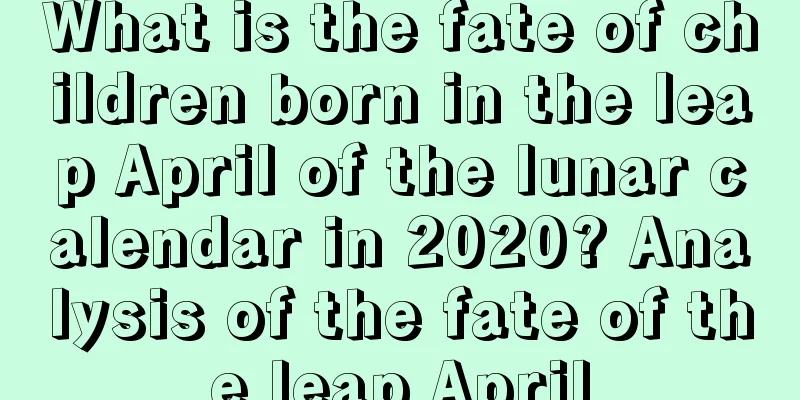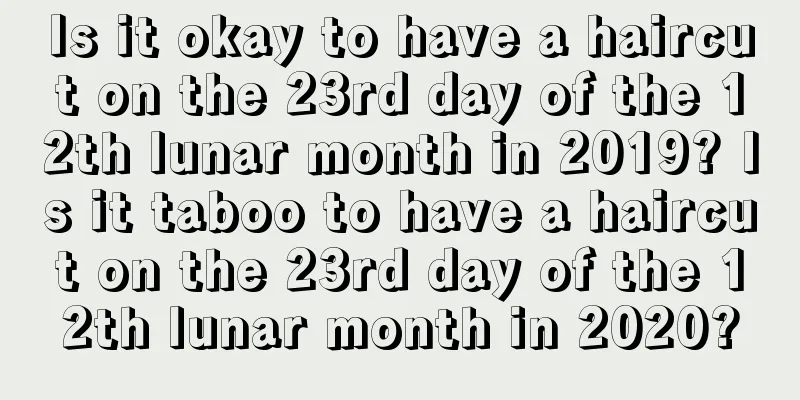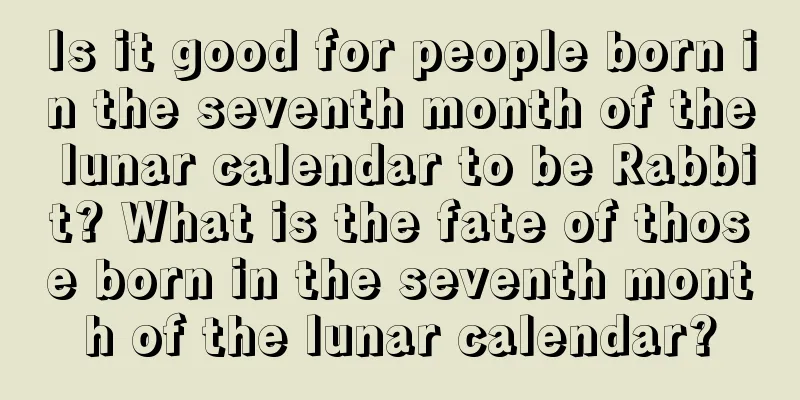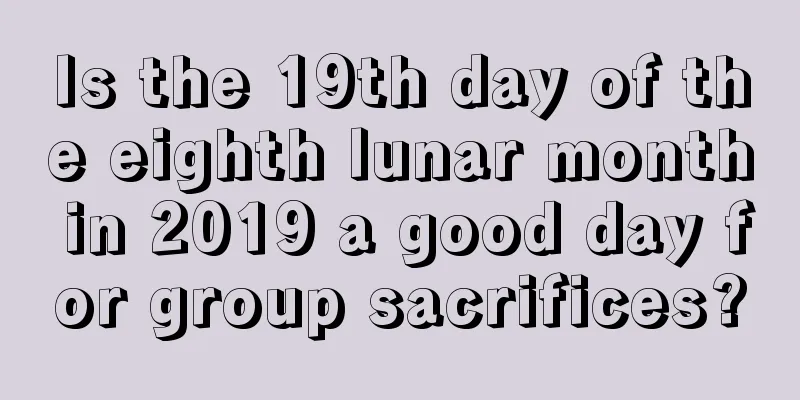What does the Spring Festival mean? What are the things that cannot be done during the Spring Festival?
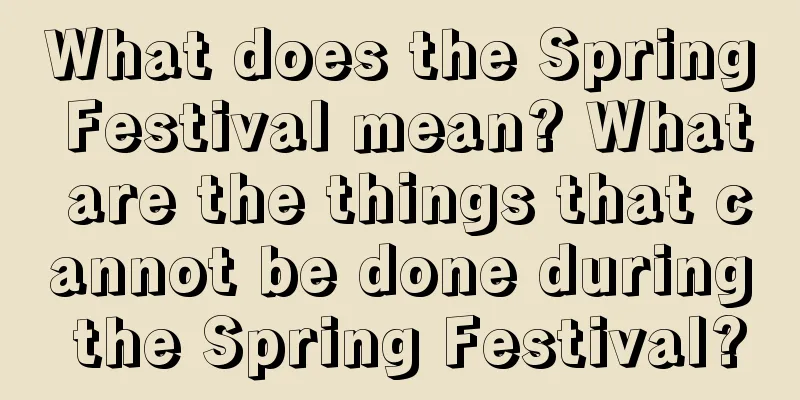
Introduction: The Spring Festival is an important festival, and the time range of the Spring Festival is very wide. So what does the Spring Festival mean, and what are the things we cannot do during the Spring Festival? The festive culture of the Chinese New Year is rich and colorful, and extraordinary. If you want to know more related content, just search in the 2019 Chinese New Year and Spring Festival special topic carefully compiled by Shuimoxiansheng.com!What does Spring Festival mean?The Spring Festival generally refers to the first day of the first lunar month (which is February 19 this year), which is the first day of the lunar year, also known as the lunar year, commonly known as "New Year".Among the people, the traditional Spring Festival refers to the period from the La Festival in the twelfth lunar month or the Kitchen God Festival on the twenty-third or twenty-fourth day of the twelfth lunar month to the nineteenth day of the first lunar month, with New Year's Eve and the first day of the first lunar month as the climax. The Spring Festival is China's most distinctive traditional festival. Chinese people have celebrated the Spring Festival for more than 4,000 years. There are many different theories about the origin of the Spring Festival, but the generally accepted one is that the Spring Festival originated in the Yu Shun period. During the Spring Festival, China's Han ethnic group and some ethnic minorities hold various activities to celebrate. What are the customs of the Spring Festival?1. Pasting Spring Festival Couplets <br /> One of the origins of Spring Festival Couplets is Peach Charms. Initially, people carved human figures out of peach wood and hung them next to the door to ward off evil spirits. Later, they painted images of door gods on peach wood, and then simplified it to writing the name of the door god on a peach wood board.2. Pasting Door Gods <br /> There is a custom of pasting Door Gods during the Spring Festival in all parts of China. The original door gods were carved from mahogany in the form of humans and hung next to people. Later, they were painted as door gods and posted on doors. 3. Paste New Year pictures <br /> Paste blessing characters, window decorations, New Year pictures, and hanging scrolls. These all have the folk functions of praying for blessings and decorating homes. New Year pictures are an ancient folk art in my country. They reflect the customs and beliefs of the general public and embody people's hopes for the future. 4. Staying up all night<br /> It is a custom in China for people to stay up all night on New Year's Eve, commonly known as "staying up all night". The New Year's Eve celebration begins with the New Year's Eve dinner. This dinner should be eaten slowly, starting from the time when the lights are turned on. Some families will eat until late at night. According to Zong Yan's "Jingchu Sui Shi Ji", the custom of eating New Year's Eve dinner has existed at least since the Southern and Northern Dynasties. The custom of staying up all night to welcome the New Year expresses both a sense of farewell and a desire to remember the passing years, and a hope for the coming New Year. 5. Lighting firecrackers <br /> There is a saying among Chinese people that "lighting firecrackers when the door is opened" is "lighting firecrackers when the door is opened". When the new year comes, the first thing every household does when they open the door is to set off firecrackers, using the sound of firecrackers to get rid of the old and welcome the new. Firecrackers are a specialty of China, also known as "firecrackers", "firecrackers" and "firecrackers". It has a very early origin and has a history of more than two thousand years. Setting off firecrackers can create a festive and lively atmosphere. It is a kind of entertainment activity during festivals and can bring joy and good luck to people. 6. New Year's greetings <br /> Visiting and paying New Year's greetings during the Spring Festival is one of the traditional customs of the New Year. It is a way for people to bid farewell to the old and welcome the new, and express good wishes to each other. On the second and third days of the Chinese New Year, people start visiting relatives and friends, wishing each other a happy new year, and congratulating each other with blessings, saying things like "Congratulations on the new beginning", "Congratulations on making a fortune", "Congratulations", "Happy New Year" etc. The significance of New Year's greetings is to visit relatives and friends to keep in touch, wish each other a happy new year, and express feelings for relatives and friends as well as good wishes for life in the new year. With the development of the times, the custom of New Year's greetings has continued to add new content and forms. The New Year's cards that are commonly used in modern society were already used in ancient China. As early as the Song Dynasty, the families and relatives of royal relatives, nobles and literati had already used special New Year's greetings cards, called "mingci" or "mingtie". What are the things you can’t do during the Spring Festival?Taboos on the first day of the Chinese New Year: Rooster Day - in the old days people would put up pictures on New Year's Day to ward off evil spirits and pray for good luck.Taboos on the second day of the Chinese New Year: Dog Day - going out to pay New Year’s greetings or worship ancestors. Taboos on the third day of the Lunar New Year: Sheep Day - "Red Mouth", prone to quarrels, not suitable for New Year's greetings. Taboos on the fourth day of the Chinese New Year: Pig Day - worship the God of Wealth. Taboos on the fifth day of the Chinese New Year: "Po Wu", which can break many taboos; the birthday of the Five Gods of Wealth, welcome the God of Wealth. Taboos on the sixth day of the Chinese New Year: Horse Day - the day to "send off the gods", shops begin to reopen. Taboos on the seventh day of the Chinese New Year: Renri - people’s birthday, gatherings for food and drinks, setting off fireworks, it is also the “birthday of fire”. Taboos on the eighth day of the Chinese New Year: Grain Day - the stars descend to the earth, and people should offer sacrifices to them. Temples set up altars on this day to offer sacrifices to the stars and accept donations. Taboos on the ninth day of the Chinese New Year: It is the birthday of the Jade Emperor and a grand ceremony to worship the Lord of Heaven is held. Taboos on the tenth day of the Chinese New Year: Birthday of Stone - Avoid using any stone tools such as millstones, pestles and rollers. The new wave of annual fortune in 2019 has already changed. Calculate your own fortune in advance, correct your mistakes if there are any, and encourage yourself if there are none, so that the new year will be smooth and safe. To calculate your new fortune in 2019, please click on the [Premium Calculation] below to learn about your new fortune. I wish you peace and happiness in the new year! |
Recommend
Is it a good day to move house on the 14th day of the twelfth lunar month in 2017?
The twelfth month of the lunar calendar is also k...
Is the Arbor Day in 2021 an auspicious day? Is Arbor Day a Chinese holiday?
Spring is the season when all things grow, so Arbo...
Is Grain in Ear a good day in 2021? What does Grain in Ear represent and what can be done auspiciously?
Grain in Ear is one of the solar terms that reflec...
Is March 16th of the lunar calendar in 2022 a bad day? Can I travel?
The third month of the lunar calendar arrives in t...
What is the fate of a boy born on October 18th of the lunar calendar? Are you destined to be an official and bring honor to your family?
Introduction: Every child’s destiny begins from th...
What will be the temperature during the Rain Water solar term in 2019? Will the weather get warmer?
Rain Water is the second solar term among the 24 s...
Analysis of the fate, fortune and personality of girls born on the Dragon Boat Festival in 2022
The Dragon Boat Festival is the day of the flying ...
Is the hexagram for the 29th day of the eighth lunar month in 2019 good? Is it an auspicious day?
Is the hexagram for the 29th day of the eighth lun...
Is New Year's Day 2021 a suitable day for ancestor worship? Do we need to eat dumplings on New Year's Day?
Introduction: Generally, it is necessary to choose...
What is the fate of people born in the Big Snow period of the Year of the Ox? Learn about the direction of their life destiny!
Introduction: People born in different years have ...
Is it auspicious to sign a contract on the first day of the first lunar month in 2020? Is it a good time to open the market and make money?
We know that the first day of the first lunar mont...
How to find the true wealth position?
Introduction: Generally speaking, when a person i...
What is the date of the 19th day of the seventh lunar month in 2018? Is it a good time to start renovation?
Introduction: The groundbreaking for renovation is...
Is April Fool's Day, April 1, 2018, a good day? Is it an auspicious day?
Introduction: Every day unfolds differently, and e...
Is the ninth day of the first lunar month in 2021 an auspicious day? What is the lunar calendar for the ninth day of the first lunar month in the Year of the Ox?
The New Year lasts until the 15th day of the first...

